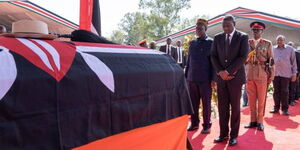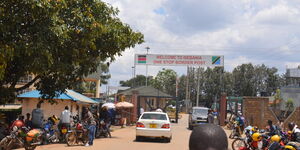Maersk, the Danish shipping conglomerate, has issued a customer advisory warning clients of anticipated cargo delays at Kenya’s Port of Mombasa. The company attributes the current berthing congestion to increased yard density and equipment challenges.
This is likely to affect various goods, including food and non-food items set for the Kenyan and other regional markets like South Sudan, Rwanda, and the Democratic Republic of the Congo (DRC), that depend on the port.
In a statement, Maersk said it has encountered higher-than-expected yard occupancy in recent weeks, leading to delays in vessel berthing and departures. The congestion has disrupted scheduled operations, prompting the company to adjust its timelines.
Compounding the situation, vessels arriving from Far East Asia are experiencing delays due to congestion in major ports such as Shanghai, Ningbo, and Singapore. Ships on this route, initially slated to arrive on Thursdays, are now expected to berth on Fridays, with further adjustments to estimated times of arrival (ETAs) possible.
This development may subsequently impact the timely discharge of import cargo. Maersk has acknowledged the possibility of "unexpected cut and runs"—situations where not all containers can be accommodated as the company strives to meet connections at transshipment ports. In such cases, the company plans to prioritise shipments on the next available vessel.
"We appreciate your patience during this time and assure you that we are working around the clock to restore normal operations for improved productivity," Maersk stated.
The Kenya Ports Authority (KPA) has reported a 12.1 per cent increase in cargo throughput at the Port of Mombasa, handling 29.92 million metric tonnes in the first nine months of 2024, compared to 26.68 million metric tonnes during the same period in 2023.
This growth is attributed to congestion at neighbouring ports, such as Dar es Salaam in Tanzania and Durban in South Africa, which has led shipping lines and importers to divert cargo to Mombasa.
Despite the increased volume, the port is grappling with challenges stemming from heightened yard density and equipment constraints. These issues have resulted in delays in vessel berthing and departures, affecting the overall efficiency of cargo handling operations.
The congestion at Mombasa Port is further exacerbated by delays in arrivals from Far East Asia. Vessels from regions including Shanghai, Ningbo, and Singapore are experiencing waiting times, leading to adjustments in their berthing schedules and potential delays in the discharge of import cargo.
In response to these challenges, Maersk has advised customers to adhere to cut-off timelines and plan for timely stacking and gate-in of export units to facilitate loading. The company has provided specific timelines for its Mawingu and Mashariki services, noting that due to current challenges, berthing, sailing, and cut-off details are subject to change.
The KPA has yet to issue any statement on the congestion issues; however, the company is implementing measures to enhance efficiency. These include infrastructure development, equipment upgrades, and process optimisation to improve cargo handling and reduce delays.












